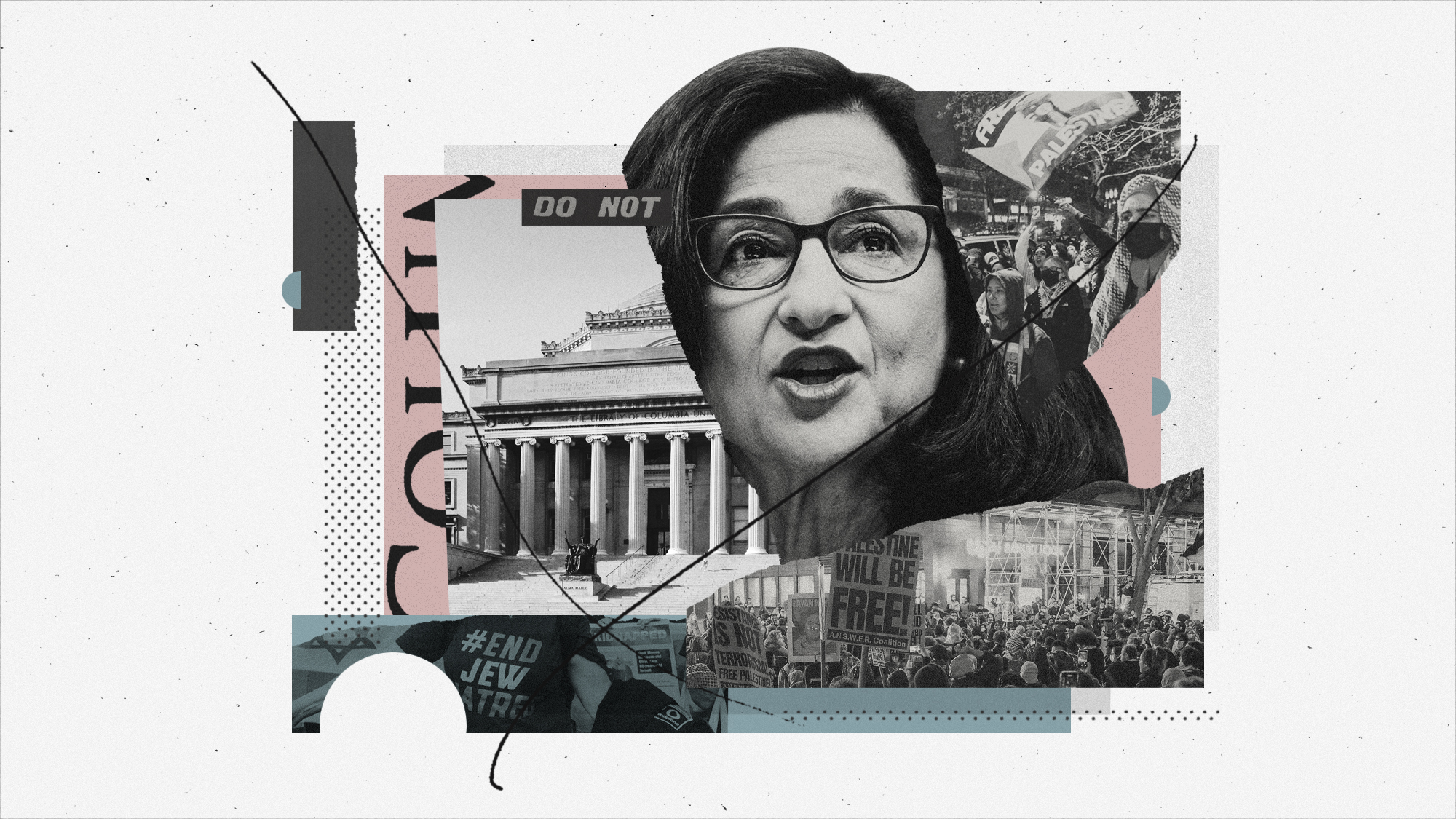Is the Gaza war tearing US university campuses apart?
Protests at Columbia University, other institutions, pit free speech against student safety


A free daily email with the biggest news stories of the day – and the best features from TheWeek.com
You are now subscribed
Your newsletter sign-up was successful
Campus unrest over the war in Gaza "has reached a fever pitch in the final weeks of classes," said The New York Times, with confrontations between authorities and pro-Palestinian protesters at Columbia University, Yale University, New York University and others across the United States. The heart of the conflict: Administrators are "struggling to balance students' free speech rights and the need to protect Jewish students" from threats to their safety.
The crisis is particularly acute at Columbia, where a rabbi linked to the school "urged Jewish students to stay home" to avoid "tense confrontations" with protesters, CNN said. (In fact, everybody is staying home: The university soon announced it was shifting to remote classes for the final weeks of the spring semester.) The White House even weighed in, condemning "blatantly antisemitic" rhetoric after videos appeared to show some Columbia protesters expressing support for Hamas' deadly Oct. 7 attack on Israel.
"School administrators and local law enforcement have cracked down on the protests," Reuters said. More than 100 protesters have been arrested at Columbia, while other students have been suspended — and similar crackdowns have taken place at Yale, NYU and the University of Minnesota. Some Republicans want to see even more: Sens. Tom Cotton (R-Ark.) and Josh Hawley (R-Mo.) this week called on President Joe Biden to send in the National Guard.
The Week
Escape your echo chamber. Get the facts behind the news, plus analysis from multiple perspectives.

Sign up for The Week's Free Newsletters
From our morning news briefing to a weekly Good News Newsletter, get the best of The Week delivered directly to your inbox.
From our morning news briefing to a weekly Good News Newsletter, get the best of The Week delivered directly to your inbox.
What did the commentators say?
"Anti-Israel, antisemitic protests at Columbia, Yale and elsewhere are getting uglier," The Wall Street Journal said in an editorial. Protesters have carried signs honoring the "martyrs of Palestine" and suggesting pro-Israel demonstrators are the "next target" of Hamas' military wing. Columbia's move to remote classes doesn't help: "Protesters are winning if they're allowed to shut down classroom instruction." Administrators seem afraid to put an end to all this. "College presidents have to take charge, restore order and protect Jewish students" — or they should lose their jobs.
The crackdowns reveal that universities like Columbia "don't value critical thought as much as they value business as usual," Sarah Jones said at New York. It's true that protests can sometimes attract "bad actors," but it's unreasonable to suggest all the anti-war activity is antisemitic "when many of the demonstrators are Jewish themselves." The protests have been largely peaceful, which means the students are guilty only of "embarrassing their universities by applying their education to the real world."
"Tom Cotton has never seen a left-wing protest he didn't want crushed at gunpoint," Adam Serwer said at The Atlantic. Cotton, remember, was the author of the infamous 2020 New York Times op-ed that called on then-President Donald Trump to send U.S. troops to bring order to cities shaken by Black Lives Matter protests. Campus leaders should protect the safety of their students. But the "kinds of mass violence and unrest" that justify a National Guard intervention are absent, with troops more "likely to escalate tensions rather than quell them." This suggests the real reason for intervention is because "powerful figures find the protesters and their demands offensive."
What next?
It's an election year, so the protests will have political ramifications. House Speaker Mike Johnson (R-La.) will visit the Columbia campus this week, The Hill said, to highlight the "troubling rise of virulent antisemitism on America's college campuses." He called on Columbia University President Minouche Shafik to resign, while Republicans in Congress are vowing to withdraw federal funds from institutions that fail to protect Jewish students. Biden, meanwhile, is treading carefully: The Washington Post said he is trying to "strike a careful balance between condemning antisemitism on college campuses and supporting students' right to protest."
A free daily email with the biggest news stories of the day – and the best features from TheWeek.com
Columbia officials are trying to pull back from the brink of further confrontation. Administrators had warned protesters to clear their encampment by end of day Tuesday, The New York Times said, but later issued a statement that protesters had agreed to clear most of their tents and to "bar discriminatory or harassing language among the protesters." But the peace may be short-lived: The university senate is expected to vote Friday on a resolution censuring Shafik for calling police in to break up the protests.
Joel Mathis is a writer with 30 years of newspaper and online journalism experience. His work also regularly appears in National Geographic and The Kansas City Star. His awards include best online commentary at the Online News Association and (twice) at the City and Regional Magazine Association.
-
 The ‘ravenous’ demand for Cornish minerals
The ‘ravenous’ demand for Cornish mineralsUnder the Radar Growing need for critical minerals to power tech has intensified ‘appetite’ for lithium, which could be a ‘huge boon’ for local economy
-
 Why are election experts taking Trump’s midterm threats seriously?
Why are election experts taking Trump’s midterm threats seriously?IN THE SPOTLIGHT As the president muses about polling place deployments and a centralized electoral system aimed at one-party control, lawmakers are taking this administration at its word
-
 ‘Restaurateurs have become millionaires’
‘Restaurateurs have become millionaires’Instant Opinion Opinion, comment and editorials of the day
-
 Should the EU and UK join Trump’s board of peace?
Should the EU and UK join Trump’s board of peace?Today's Big Question After rushing to praise the initiative European leaders are now alarmed
-
 How are Democrats turning DOJ lemons into partisan lemonade?
How are Democrats turning DOJ lemons into partisan lemonade?TODAY’S BIG QUESTION As the Trump administration continues to try — and fail — at indicting its political enemies, Democratic lawmakers have begun seizing the moment for themselves
-
 How did ‘wine moms’ become the face of anti-ICE protests?
How did ‘wine moms’ become the face of anti-ICE protests?Today’s Big Question Women lead the resistance to Trump’s deportations
-
 How are Democrats trying to reform ICE?
How are Democrats trying to reform ICE?Today’s Big Question Democratic leadership has put forth several demands for the agency
-
 ‘The censorious effect is the same, even if deployed covertly’
‘The censorious effect is the same, even if deployed covertly’Instant Opinion Opinion, comment and editorials of the day
-
 Is the Gaza peace plan destined to fail?
Is the Gaza peace plan destined to fail?Today’s Big Question Since the ceasefire agreement in October, the situation in Gaza is still ‘precarious’, with the path to peace facing ‘many obstacles’
-
 Trump demands $1B from Harvard, deepening feud
Trump demands $1B from Harvard, deepening feudSpeed Read Trump has continually gone after the university during his second term
-
 Why is Tulsi Gabbard trying to relitigate the 2020 election now?
Why is Tulsi Gabbard trying to relitigate the 2020 election now?Today's Big Question Trump has never conceded his loss that year
